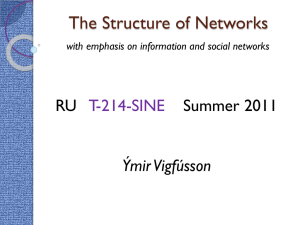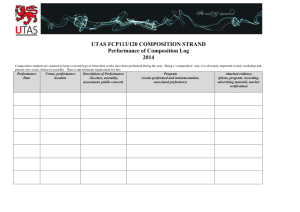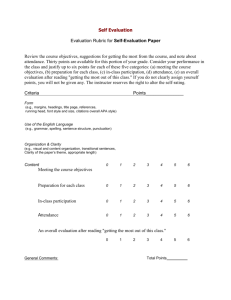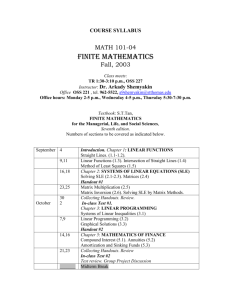cross cultural management
advertisement
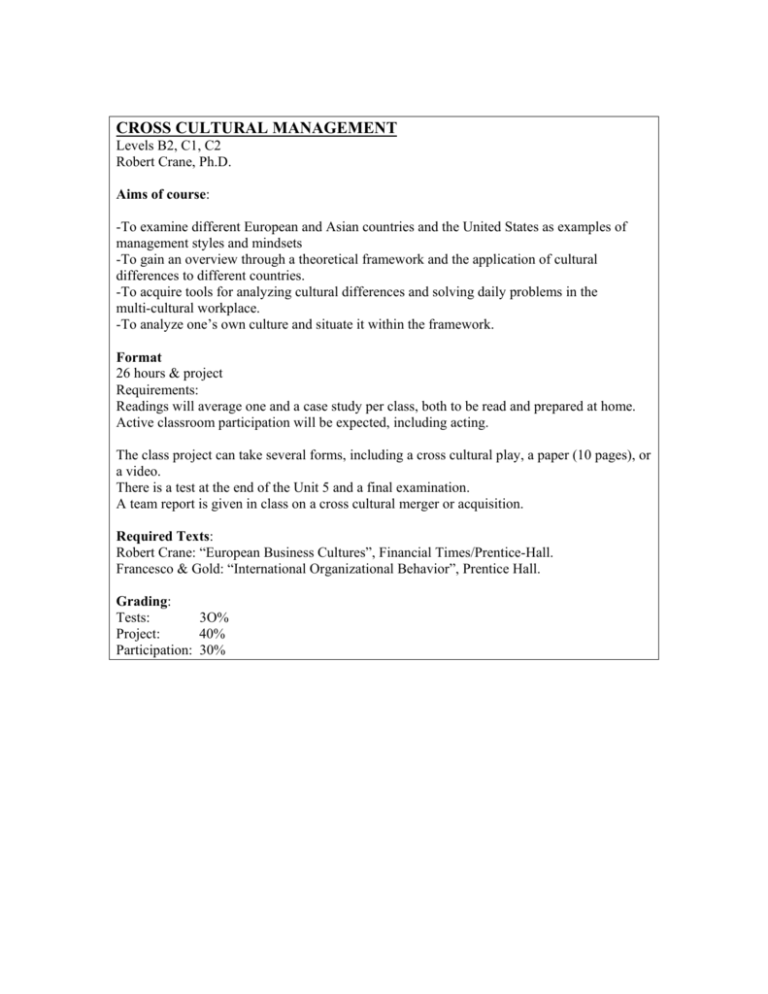
CROSS CULTURAL MANAGEMENT Levels B2, C1, C2 Robert Crane, Ph.D. Aims of course: -To examine different European and Asian countries and the United States as examples of management styles and mindsets -To gain an overview through a theoretical framework and the application of cultural differences to different countries. -To acquire tools for analyzing cultural differences and solving daily problems in the multi-cultural workplace. -To analyze one’s own culture and situate it within the framework. Format 26 hours & project Requirements: Readings will average one and a case study per class, both to be read and prepared at home. Active classroom participation will be expected, including acting. The class project can take several forms, including a cross cultural play, a paper (10 pages), or a video. There is a test at the end of the Unit 5 and a final examination. A team report is given in class on a cross cultural merger or acquisition. Required Texts: Robert Crane: “European Business Cultures”, Financial Times/Prentice-Hall. Francesco & Gold: “International Organizational Behavior”, Prentice Hall. Grading: Tests: 3O% Project: 40% Participation: 30% SYLLABUS 1. Introduction Culture and Management Culture as a framework for one’s thinking Dimensions of Culture Course structure Structure: In-Class Activity: International Awareness Survey Reading: “Cultural Constraints in Management Theories”: Hofstede Case Study: “A Cultural Clash in the Entertainment Industry” 2. Ethics and Social Responsibility What are ethics? Four Perspectives on Ethics Social Responsibility of Corporations Organizational ethics Structure: In-Class Activity: “Bribery in International Business” Reading: “The Globalization of Business Ethics” Case Study: “Conscience or the Competitive Edge?” 3. Negotiation and Conflict Resolution What is negotiation? The negotiation process. How culture influences the negotiation process. Negotiating tactics. Structure: In-Class Activity: “The Owl” Reading: “Negotiating with Romans” Case Study: From Saatchi & Saatchi to Cordiant PLC 4. Working in Multicultural Teams What is a group? Group processes. Group structure. What is a team? Group and Team Composition. Groups at work in four cultures. Structure: In-Class Activity: Japanese Decision-making Exercise” Reading: “The Tyranny of a Team Ideology” Case Study: “The Careless Collaborators” 5. Organizational Culture: What is Organizational Culture? National and Global Culture. Levels of Organizational Culture; Analyzing Organizational Culture. Managing and Changing Organizational Culture. Structure: In-Class Activity: Mapping Organizational Culture Reading: “How Chrysler Created an American Keiretsu” Case Study: Managing a Diverse Workforce in Indonesia Test 6. Motivation: What is Motivation? U.S. Motivation Theories and their Application Elsewhere. How Culture Influences Rewards The Meaning of Work across Cultures Structure: In-Class Activity: Work Values Exercise Reading: Chinese Employees’ Perceptions of Distribution Fairness Case Study: “Buckeye Glass Company in China” 7. Leadership: What is leadership? Culture and Leadership Leadership Theories Types of Leadership Legitimacy Leadership in Two Cultures Women as Leaders Structure: In-Class Activity: Dimensions of National Culture and Effective Leadership Patterns Reading: Understanding the Bear (Russia) Case Study: Rus Wane Equipment: Joint Venture in Russia 8. International Human Resource Management: What is International Human Resource Management ? International Corporate Strategy and IHRM Major IHRM functions Managing Expatriates Structure: In-Class Activity: Management in the Year 2200 Reading: Management Development: An African Focus Case Study: Yataka Nakamura: A Foreigner in his Native Land 9. Organizational Structure: What is Organizational Structure ? Elements of Structure Types of Organizational Structure Structural Variations Emerging Structures in the Global Economy Structure: In-Class Activity: Onion, Iceberg...: Mapping Organizational Culture Reading: Managerial Leadership in Chinese Industrial Enterprises Case Study: Portrait of a Young Russian Capitalist 10. Organizational Change: What is Organizational Change ? Sources of Organizational Change National Culture & Organizational Change Organizational Culture & Change Macro-Organizational Change Theories Structure: In-Class Activity: None Reading: Improving the Efficiency of Government in Germany Case Study: Francisco de Narvaez at Tia 11. Managing Diversity & Future Trends: What is Diversity? How do different Cultures view Diversity Cox’s Model of the Multicultural Organization How Organizations Manage Diversity Unintended Results of Managing Diversity Managing Diversity for Competitive Advantage Structure: In-Class Activity: Race for Outer Space Reading: A New Paradigm for Managing Diversity Case Study: Elle Moore (Middle East) Final Examination Robert Crane, Ph.D. 29, rue Jussieu 75005 Paris France tels:331.43.37.60.45/336.77.22.25.89


